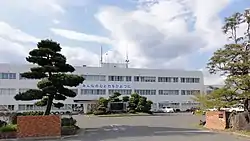Higashi-Matsushima City
東松島市 | |
|---|---|
 Higashi-Matsushima City Hall | |
 Flag  Seal | |
 Location of Higashi-Matsushima in Miyagi Prefecture | |
 Higashi-Matsushima City | |
| Coordinates: 38°25′34.5″N 141°12′37.5″E / 38.426250°N 141.210417°E | |
| Country | Japan |
| Region | Tōhoku |
| Prefecture | Miyagi |
| Government | |
| • Mayor | Iwao Atsumi |
| Area | |
| • Total | 101.36 km2 (39.14 sq mi) |
| Population (October 10, 2020) | |
| • Total | 39,098 |
| • Density | 390/km2 (1,000/sq mi) |
| Time zone | UTC+9 (Japan Standard Time) |
| Phone number | 0225-82-1111 |
| Address | 36-1 Kamikawado, Yamoto, Higashimatsushima-shi, Miyagi-ken 981-0503 |
| Climate | Cfa |
| Website | Official website (in Japanese) |
| Symbols | |
| Flower | Sakura |
| Tree | Pine |
Higashi-Matsushima (東松島市, Higashimatsushima-shi) is a city located in Miyagi Prefecture, Japan. As of 1 June 2020, the city had an estimated population of 39,580 in 16102 households,[1] and a population density of 390 persons per km2. The total area of the city is 101.36 square kilometres (39.14 sq mi).
Geography
Higashi-Matsushima (lit. "East Matsushima") is in eastern Miyagi Prefecture in the Tōhoku region of northern Honshu. The city borders on Matsushima Bay to the west, and the Pacific Ocean (Ishinomaki Bay) to the south. Its coastline forms part of the Sanriku Fukkō National Park, which stretches north to Aomori Prefecture.
Neighboring municipalities
Miyagi Prefecture
Climate
Higashi-Matsushima has a humid subtropical climate (Köppen climate classification Cfa) characterized by mild summers and cold winters. The average annual temperature in Higashi-Matsushima is 12.2 °C (54.0 °F). The average annual rainfall is 1,191 millimetres (46.9 in) with September as the wettest month. The temperatures are highest on average in August, at around 24.6 °C (76.3 °F), and lowest in January, at around 0.8 °C (33.4 °F).[2]
| Climate data for Higashimatsushima (2011−2020 normals, extremes 2011−present) | |||||||||||||
|---|---|---|---|---|---|---|---|---|---|---|---|---|---|
| Month | Jan | Feb | Mar | Apr | May | Jun | Jul | Aug | Sep | Oct | Nov | Dec | Year |
| Record high °C (°F) | 12.5 (54.5) |
19.6 (67.3) |
21.6 (70.9) |
29.7 (85.5) |
30.7 (87.3) |
31.4 (88.5) |
34.9 (94.8) |
35.8 (96.4) |
33.2 (91.8) |
28.7 (83.7) |
21.9 (71.4) |
16.6 (61.9) |
35.8 (96.4) |
| Mean daily maximum °C (°F) | 5.0 (41.0) |
5.9 (42.6) |
10.5 (50.9) |
15.1 (59.2) |
20.6 (69.1) |
23.1 (73.6) |
26.7 (80.1) |
28.8 (83.8) |
25.5 (77.9) |
19.9 (67.8) |
13.7 (56.7) |
7.4 (45.3) |
16.9 (62.3) |
| Daily mean °C (°F) | 0.8 (33.4) |
1.3 (34.3) |
5.2 (41.4) |
9.8 (49.6) |
15.6 (60.1) |
19.1 (66.4) |
22.8 (73.0) |
24.6 (76.3) |
21.0 (69.8) |
14.8 (58.6) |
8.4 (47.1) |
2.9 (37.2) |
12.2 (53.9) |
| Mean daily minimum °C (°F) | −3.4 (25.9) |
−3.2 (26.2) |
−0.3 (31.5) |
4.2 (39.6) |
11.3 (52.3) |
15.9 (60.6) |
20.0 (68.0) |
21.3 (70.3) |
17.0 (62.6) |
9.7 (49.5) |
3.2 (37.8) |
−1.2 (29.8) |
7.9 (46.2) |
| Record low °C (°F) | −13.0 (8.6) |
−13.3 (8.1) |
−6.6 (20.1) |
−2.2 (28.0) |
3.7 (38.7) |
8.9 (48.0) |
13.8 (56.8) |
13.3 (55.9) |
7.2 (45.0) |
1.0 (33.8) |
−4.6 (23.7) |
−9.9 (14.2) |
−13.3 (8.1) |
| Average precipitation mm (inches) | 34.1 (1.34) |
25.1 (0.99) |
79.1 (3.11) |
97.1 (3.82) |
94.3 (3.71) |
100.7 (3.96) |
135.1 (5.32) |
118.6 (4.67) |
157.5 (6.20) |
147.6 (5.81) |
48.0 (1.89) |
43.3 (1.70) |
1,089.4 (42.89) |
| Average precipitation days (≥ 1.0 mm) | 4.8 | 5.7 | 6.7 | 8.3 | 9.2 | 8.4 | 11.5 | 10.3 | 10.3 | 8.2 | 5.8 | 6.7 | 95.9 |
| Source: Japan Meteorological Agency[3][2] | |||||||||||||
Demographics
Per Japanese census data,[4] the population of Higashi-Matsushima has been mostly increasing over the past 40 years.
| Year | Pop. | ±% |
|---|---|---|
| 1920 | 19,142 | — |
| 1930 | 21,862 | +14.2% |
| 1940 | 23,423 | +7.1% |
| 1950 | 37,363 | +59.5% |
| 1960 | 33,654 | −9.9% |
| 1970 | 32,192 | −4.3% |
| 1980 | 36,865 | +14.5% |
| 1990 | 40,424 | +9.7% |
| 2000 | 43,180 | +6.8% |
| 2010 | 42,903 | −0.6% |
| 2020 | 39,098 | −8.9% |
History
The area of present-day Higashi-Matsushima was part of ancient Mutsu Province, and has been settled since at least the Jōmon period by the Emishi people. During the Nara period, the area came under the control of colonists from the Yamato dynasty based at nearby Tagajō. During the Sengoku period, the area was contested by various samurai clans before the area came under the control of the Date clan of Sendai Domain during the Edo period. Following the Meiji restoration, the area was organized into Monō District, Miyagi Prefecture. The town of Yamoto was created on April 1, 1940 and the town of Naruse on May 3, 1955.
The city of Higashi-Matsushima was created on April 1, 2005, when the towns of Naruse and Yamoto were merged.
2011 Earthquake disaster

On March 11, 2011, Higashi-Matsushima was severely hit by the 2011 Tōhoku earthquake and tsunami resulting in at least 1,039 deaths,[5] and the destruction of over 11,000 structures, or approximately two-thirds of the buildings in the city limits. During the tsunami, a 45-metre ship, the Chōkai Maru, was hurled over a pier and left aground in the city. At the time of the disaster, Higashi-Matsushima had still not fully recovered from a previous major earthquake in 2003.[6][7] About 63% of the town was inundated by the tsunami.[8]
Government
Higashi-Matsushima has a mayor-council form of government with a directly elected mayor and a unicameral city legislature of 18 members. Higashi-Matsushima contributes one seat to the Miyagi Prefectural legislature. In terms of national politics, the city is part of Miyagi 5th district of the lower house of the Diet of Japan.
Economy
Higashi-Matsushima traditionally has been a center for commercial fishing, especially for the cultivation of oysters and on tourism. The Japan Air Self Defense Force’s Matsushima Air Field is located in Higashi-Matsushima.
Education
Higashi-Matsushima has eight public elementary schools and three middle schools operated by the city government, and two public high school operated by the Miyagi Prefectural Board of Education.
Transportation
Railway
![]() East Japan Railway Company (JR East) - Senseki Line
East Japan Railway Company (JR East) - Senseki Line
- Rikuzen-Ōtsuka - Tōna - Nobiru - Rikuzen-Ono - Kazuma - Yamoto - Higashi-Yamoto - Rikuzen-Akai
Highway
 Sanriku Expressway (Naruse-Okumatsushima, Yamoto, and Ishinomaki interchanges)
Sanriku Expressway (Naruse-Okumatsushima, Yamoto, and Ishinomaki interchanges) National Route 45
National Route 45
Local attractions
- Satohama shell mound, National Historic Site[9]
Noted people from Higashi-Matsushima
- Yutaka Abe, actor, movie director
- Rina Gonoi, judoka and former Ground Self-Defense Force officer
References
- ↑ Higashimatsushima city official statistics(in Japanese)
- 1 2 気象庁 / 平年値(年・月ごとの値). JMA. Retrieved March 22, 2022.
- ↑ 観測史上1~10位の値(年間を通じての値). JMA. Retrieved March 22, 2022.
- ↑ Higashi-Matsushima population statistics
- ↑ NOAA Data 2 April 2011
- ↑ Tsunami survivors face monstrous cleanup task, Japan Times, 26 March 2011
- ↑ Gilhooly, Rob, "Tsunami-hit towns face dire future", Japan Times, 1 April 2011, p. 4.
- ↑ NHK, "Tsunami flooded 100 square kilometers of city land", 29 March 2011.
- ↑ 里浜貝塚. Cultural Heritage Online (in Japanese). Agency for Cultural Affairs. Retrieved 25 December 2016.
External links
- Official website (in Japanese)